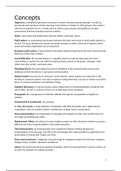Concepts
Hegemony: a temporary agreement or process in which a dominant group attempts to build up,
perpetuate and reproduce certain meanings and practices in relation to other groups, who conform
with this arrangement up to a certain point in order to give purpose and significance to their
environment and their everyday practical activities
Myths: value-laden and implicit ideas that live within a particular culture
Public sphere: an autonomous social space between the state and society in which public opinion is
formed. The space between the private and public domains in which a diversity of opinions about
social and societal organization can be expressed.
Bourgeois public sphere: a space between the public authority exercised by the state and the private
daily lives of the state’s citizens.
Commodification: the transformation in a capitalist society of cultural expressions into mere
commodities or ‘goods’ for sale, with the emphasis being placed on the goods’ exchange value
rather than their artistic and moral value.
Mediating factors: the psychological and social conditions in the communication process that
moderate or limit the effects of persuasive communication.
Opinion leaders: key persons in someone’s social network, whose opinions are important in the
forming of a personal opinion, not only in respect of voting behaviour, but also in relation to all other
forms of consumer behaviour and attitude forming.
Cognitive dissonance: if a person knows various things that are not psychologically consistent with
one another, he will, in a variety of ways, try to make them more consistent.
Propaganda: the management of collective attitudes through the manipulation of significant
symbols.
Gemeinschaft & Gesellschaft: see summary
A mass, the masses: a large collection of individuals with little personality and a highly diverse
composition, who are isolated, uniform, levelled and, to large extent, manipulated
Mass communication: the transmission of messages and symbols via radio, film and the press to a
very large and widespread public.
Displacement effects: the advent of a new medium compels an older dominant medium to accept a
different and more marginal position in the media repertoire.
Telecommunication: all communication over a significant distance without the physical
transportation of the message and also to the technologies that make possible the registration and
preservation of sounds and images over time.
Mean world syndrome: a negatively coloured image of a dangerous world full of threats, leading to
feelings of fear, isolation, alienation and distrust
Labour: the mental and physical capacities of people, which are exercised when a person creates use
of value; for example, by making a product
1





